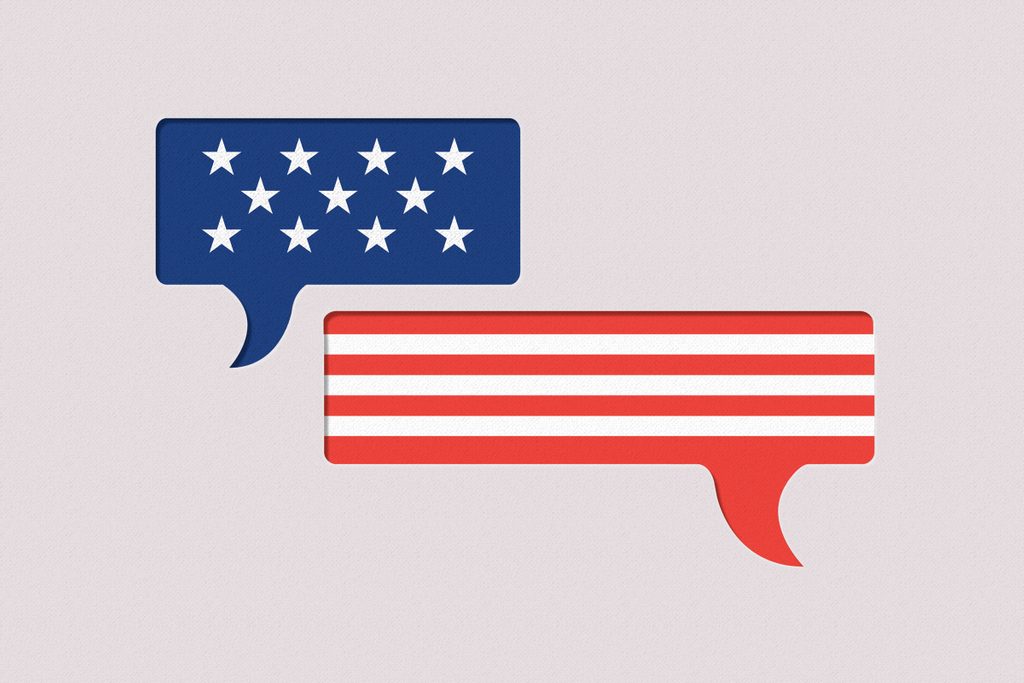This Is What the First Amendment Really Means
Updated: Oct. 24, 2022

Contrary to what many people believe, freedom of speech only applies to certain situations. Do you know what your First Amendment rights are?
Freedom of speech is one of our most treasured rights as Americans. It’s also one of the most easily misunderstood. Recently, social media companies including Twitter and Facebook banned former President Donald Trump from their platforms, while Google, Apple, and Amazon took steps to remove Parler, the social media app favored by many of his supporters. Many citizens wondered if these steps were an infringement of their First Amendment rights. After all, doesn’t the First Amendment guarantee our right to express ourselves freely?
Yes…and no, says Jared Carter, professor of law at Vermont Law School for answers. Read on for an in-depth look at what the First Amendment really means. You’ll also want to make sure you know the truth behind these myths about the U.S. Constitution most Americans believe.
What is the First Amendment?
The First Amendment is less than 50 words long, but each one was carefully chosen to serve as the bedrock for the freedoms we hold so dear. It states, “Congress shall make no law respecting an establishment of religion, or prohibiting the free exercise thereof; or abridging the freedom of speech, or of the press, or the right of the people peaceably to assemble, and to petition the Government for a redress of grievances.”
Here are 19 political questions you’ve been too embarrassed to ask.
What does it mean?
When read carefully, it becomes clear that the First Amendment only restricts the government from interfering with our freedom of speech, Carter points out. “The government is not allowed to silence your speech, based on, say your viewpoint or your political views,” he says. On the other hand, the First Amendment does not apply to private companies like Twitter or Facebook.
To further illuminate how this works, Carter shares this example: “Let’s say you own a restaurant and an individual repeatedly comes into the establishment and disrupting other diners. You as the restaurant owner can say to that person, ‘you’re no longer welcome in this private business.'” This is why the First Amendment is not relevant in regards to Twitter’s ban on the former president, he says, because just like the hypothetical restaurant, Twitter is a private business.
Test your knowledge of the amendments to the Constitution.
That’s not to say that the government cannot limit speech under any circumstance
Although our First Amendment rights guarantee we can express even the most controversial views without interference from the government, there are limits. These include:
- Inciting lawlessness. “Speech directed at immediately inciting lawlessness and violence is prohibited,” Carter says. This means you aren’t allowed to encourage anyone to rob banks, destroy the library, or commit other acts of violence.
- Threats to commit a crime. Telling someone you will kill them if they don’t do what you want is considered a threat and is not protected speech.
- Fighting words. Also, prohibited are “fighting words,” which refers to slinging personal insults in a face-to-face confrontation that are likely to provoke an immediate physical fight.
- Defamation. Spreading falsehoods and lies that will damage the reputation of other people is not protected speech. This is particularly important in the world of journalism; the press can’t maliciously run stories containing untruths about individuals or companies without suffering civil liability.
- False advertising. A company can’t falsely claim or mislead people to believe their product is a miracle drug that cures cancer or burns all your excess fat while you sleep. Interestingly enough, political speeches are held to a lesser standard here, so the government is unlikely to interfere with a politician who makes misleading statements.
- Child pornography. Child pornography is illegal and not permitted or protected under the First Amendment.
- Content-neutral restrictions. Noise restrictions, bans on blocking traffic, or large signs in areas that may distract drivers or prove unsightly are also generally legal. The key here is that those restrictions need to be evenly and neutrally applied. A noise ban, for instance, couldn’t apply to just certain types of music, and a ban of large signs couldn’t apply to just one political party.
Additionally, our First Amendment rights can also be restricted if we have an established relationship with the government. An example of this would be employees and students at a public school. Teachers aren’t allowed, for instance, to encourage students to take illegal drugs. Also, if your relationship with the government gives you access to classified information, you can be prohibited from sharing that.
On the other hand, the government does explicitly have the power to do these 14 bizarre things.
Sources:
- Jared Carter, assistant professor of law at Vermont Law School
- The National Constitution Center: “Freedom of Speech and the Press”
